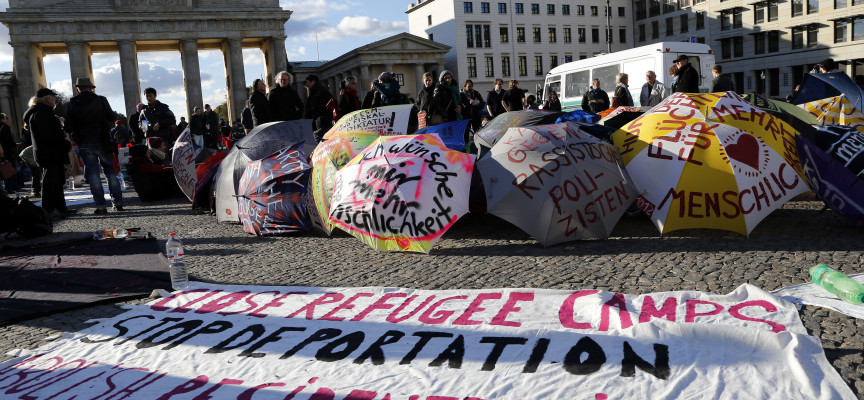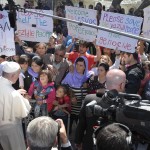On 9 April, the police have cleared a makeshift refugee camp in the center of Berlin, which for a year had provided accommodation for over 100 people. Those who were staying in the center were moved to a hostel or other safe facilities, where, in addition to finding a bed, they received a grant of 100 Euros. The relevant state departments are now engaged to carry out the ordinary asylum procedures, which in many cases could also lead to repatriation to Italy.
From Africa, in fact, many of the Berliner refugees have reached Europe landing in Lampedusa, the island that rose to international fame in July last year with the visit of Pope Francis. On that occasion, the Pope warned against a “globalization of indifference” and condemned the death of thousands of refugees drowned in the Mediterranean as a “sin”.
The refugee camp in the German capital has caused a stir, but also fueled many conflicts. The sanitary conditions were poor, the residents of the area felt harassed. And to think that the majority of refugees camped in Berlin had safe housing in other regions of Germany, but had joined the refugee camp as a form of political protest, to draw attention to their plight.
This is because in Germany, a country that since the war in the former Yugoslavia in the 1990s has experienced several waves of immigration, refugees live a safe life, although regulated in a rather rigid manner. These people are forced to live in the homes or in the shelters provided by the State. They are not allowed to work, but have to wait for a court to decide whether or not they are granted the longed-for asylum.
Many others are “tolerated” in Germany for humanitarian or other reasons. Despite the fact that the German State provides them with everything they need for the whole period (food, accommodation, etc.), any refugees hardly bear their condition.
And with the clearing of the refugee camp in Berlin, the debate about how Germany is handling the refugee issue has been reignited. On the other hand it is also true that many of the refugees are happy to find a more stable home. For the authorities, the refugee issue remains a difficult common sense endeavour. They do not want Germany to be considered a paradise all over the world, where refugees are granted everything they need. In doing so, in fact, there would be many more people willing to come to Germany .
Yet if the authorities behave in such an unfriendly and bureaucratic manner, in order to lead the refugees to despair, they will show a serious lack of solidarity. In this case, it is always the responsibility of the Church and of charitable organizations such as the “Caritas” or the “Diakonie” to provide help and mediation. The initiative regarding a church asylum was particularly successful: if the court decrees the deportation of refugees, despite the fact that the situation in their countries of origin is unbearable or have already settled in Germany for some time, in some cases the German church communities manage to intervene and welcome the refugees. Subsequently, through discussions with the authorities and the police, they are able to get another limited period approved or at least a longer period of tolerance. In the meantime, then, a number of exceptional humanitarian procedures for particularly serious cases are also adopted.
When it comes to national policy, of course, the Church cannot play the role of the law-maker, who must learn to find the right balance between solidarity with the refugees, and the fear of the population before the stranger, as well as an overload of social security. But where law enforcement involves inhumane conditions, the Churches are called upon to defend and support the refugees.
Mitten in Berlin ist am 9. April ein improvisiertes Flüchtlings-Zelt-Lager von der Polizei geräumt worden, in dem mehr als 100 Menschen länger als ein Jahr gelebt hatten. Fast alle Bewohner sind jetzt in einem Hostel und in anderen gesicherten Unterkünften untergebracht worden. Sie erhielten dort ein Bett und ein Begrüßungsgeld von 100 Euro. Die staatlichen Stellen bemühen sich nun um ein geregeltes Asylverfahren, an dessen Ende in vielen Fällen auch die Rückabschiebung nach Italien stehen könnte.
Manche der Berliner Flüchtlinge waren über die Insel Lampedusa aus Afrika nach Europa gekommen – jene italienische Insel, die durch den Besuch von Papst Franziskus im vergangenen Juli weltweite Berühmtheit erlangt hat. Der Papst warnte damals mit eindringlichen Worten vor einer „Globalisierung der Gleichgültigkeit” und sprach angesichts Tausender ertrunkener Bootsflüchtlinge im Mittelmeer von einer „Schande”.
Das Zeltlager der Flüchtlinge in Berlin hat in der deutschen Hauptstadt große Aufmerksamkeit, aber auch zahlreiche Konflikte verursacht. Die hygienischen Verhältnisse waren schlecht, Anwohner fühlten sich belästigt. Tatsächlich hatten die meisten dort campierenden Flüchtlinge an anderen Orten in Deutschland eine gesicherte Unterkunft, ihr Camp verstanden sie als eine Form des politischen Protests, um auf ihre Lage aufmerksam zu machen.
Denn in Deutschland, das seit dem Jugoslawienkrieg der 1990er Jahre schon lange Erfahrung mit Flüchtlingswellen hat, ist das Leben der Flüchtlinge zwar sicher, aber relativ streng reglementiert. Sie müssen sich in Wohnungen oder Heimen aufhalten, die der Staat ihnen zuweist. Sie dürfen nicht arbeiten. Und sie müssen warten, bis ein Gericht entscheidet, dass sie als politischer Flüchtling den begehrten Asylstatus erhalten.
Andere werden aus humanitären oder anderen Gründen in Deutschland „geduldet”. Obwohl ihre materielle Existenz (Nahrung, Wohnung usw.) während ihrer Wartezeit vom deutschen Staat gesichert wird, empfinden viele Flüchtlinge ihre Situation als schwer erträglich.
Die Debatte darüber, wie Deutschland mit Flüchtlingen umgeht, ist durch das jetzt aufgelöste Camp in Berlin neu belebt worden. Aber viele Flüchtlinge sind auch froh, dass sie jetzt wieder in einer festen Wohnung leben können. Für die Behörden bleibt der Umgang mit den Flüchtlingen ein schwieriger Balance-Akt. Sie wollen nicht, dass Deutschland weltweit als ein Paradies gesehen wird, in dem Flüchtlingen alles geschenkt wird, was sie brauchen. Denn dann würden noch mehr Menschen als bisher versuchen, nach Deutschland zu kommen.
Doch wenn die Behörden so abweisend und so bürokratisch handeln, dass Flüchtlinge in die Verzweiflung getrieben werden, ist das ein eklatanter Mangel an Solidarität. Hier ist es immer wieder Aufgabe der Kirchen und ihrer Hilfswerke wie „Caritas” oder „Diakonie”, zu helfen und zu vermitteln. Bewährt hat sich zum Beispiel das „Kirchen-Asyl”: Wenn Flüchtlinge nach einem Gerichtsurteil abgeschoben werden sollen, obwohl die Lage in ihrer Heimat unerträglich ist, oder sie längst in Deutschland Wurzeln gefasst haben, greifen in manchen Fällen deutsche Kirchengemeinden ein und nehmen die Flüchtlinge auf. Sie versuchen dann durch Gespräche mit der Polizei und den Behörden zu erreichen, dass doch noch eine begrenzte oder eine längere Duldung möglich wird. Inzwischen gibt es auch humanitäre Ausnahmeregelungen für besonders extreme Fälle.
Auf der Ebene der großen Politik in Europa können die Kirchen den Gesetzgebern nicht die Verantwortung abnehmen. Diese müssen einen Mittelweg finden zwischen der Solidarität mit den Flüchtlingen auf der einen Seite und den Ängsten ihrer Bürger vor den Fremden und vor einer Überlastung der Sozialkassen auf der anderen Seite. Aber dort, wo die Anwendung der Gesetze zu inhumanen Konsequenzen führt, sind die Kirchen als Anwälte und Unterstützer der Flüchtlinge gefragt.
I confini della solidarietà
Lo scorso 9 aprile la polizia ha sgomberato un campo profughi improvvisato al centro di Berlino, che per un anno aveva fornito alloggio a oltre 100 persone. Chi era ospitato nel centro è stato trasferito in un ostello o in altre strutture sicure, dove, oltre a trovare un letto, ha ricevuto un contributo di 100 euro. Gli uffici statali competenti sono ora impegnati a portare avanti le regolari procedure di asilo, che in molti casi potrebbero portare anche a un rimpatrio in Italia.
Dall’Africa, infatti, molti dei profughi berlinesi hanno raggiunto l’Europa approdando a Lampedusa, l’isola che a luglio dell’anno scorso con la visita di Papa Francesco aveva raggiunto fama internazionale. All’epoca il Papa mise in guardia da una “globalizzazione dell’indifferenza” e definì la morte di migliaia di profughi, annegati nel Mediterraneo, un “peccato”.
La tendopoli nella capitale tedesca ha suscitato grande scalpore, ma alimentato anche numerosi conflitti. Le condizioni igieniche erano precarie, gli abitanti della zona si sentivano importunati. E dire che per la maggior parte i rifugiati accampati a Berlino avevano un alloggio sicuro in altre parti della Germania, ma avevano aderito alla tendopoli come forma di protesta politica, per richiamare l’attenzione sulla loro condizione.
Questo perché in Germania, un Paese che a partire dalla guerra nell’ex Yugoslavia negli anni 1990 ha vissuto numerose ondate migratorie, la vita dei profughi è sicura, ma disciplinata in maniera piuttosto rigida. Questa gente è costretta a vivere nelle case o nelle strutture di accoglienza predisposte dallo Stato. Non sono autorizzati a lavorare, ma devono attendere che un tribunale decida se concedere loro o meno l’ambito asilo.
Tanti altri vengono “tollerati” in Germania per ragioni umanitarie o di altro tipo. Nonostante lo Stato tedesco provveda per tutto il periodo di attesa alla loro sussistenza materiale (cibo, alloggio ecc.), molti profughi difficilmente sopportano la loro condizione.
E con lo sgombero della tendopoli di Berlino si è riacceso il dibattito su come la Germania gestisca la questione dei profughi. D’altro canto è anche vero che molti di loro sono contenti di ritrovare una dimora più stabile. Per le autorità la questione dei rifugiati resta una difficile prova di equilibrio. Non vogliono che in tutto il mondo la Germania sia considerata un paradiso, in cui ai profughi è concesso tutto ciò di cui hanno bisogno. Così facendo, infatti, sarebbero molte di più le persone che punterebbero a venire in Germania.
Eppure, se le autorità si comportano in maniera così scostante e burocratica, da condurre i profughi alla disperazione, danno prova di una grave mancanza di solidarietà. In questo caso è sempre compito della Chiesa e delle organizzazioni caritative, come la “Caritas” o la “Diakonie”, fornire aiuto e mediazione. Particolare successo ha avuto l’iniziativa dell’asilo ecclesiastico: laddove il tribunale decida per l’espulsione dei profughi, nonostante la loro situazione nei Paesi di origine sia insostenibile o da tempo abbiano messo radici in Germania, in alcuni casi le comunità ecclesiastiche tedesche riescono a intervenire, accogliendo i profughi. Successivamente, attraverso colloqui con le autorità e la polizia, riescono a farsi approvare un altro periodo limitato o comunque più lungo di tolleranza. Nel frattempo, poi, sono state varate anche una serie di procedure umanitarie d’eccezione per casi particolarmente gravi.
A livello di politica nazionale, ovviamente, la Chiesa non può assumersi il ruolo del legislatore, che deve imparare a trovare la giusta misura fra la solidarietà con i profughi e la paura della popolazione dinanzi allo straniero, oltre che a un sovraccarico della previdenza sociale. Ma là dove l’applicazione delle leggi comporta condizioni disumane, le Chiese sono chiamate a difendere e appoggiare i profughi.
Ludwig Ring-Eifel
Chefredakteur, Kna (Deutschland)
Latest posts by Ludwig Ring-Eifel (see all)
- What will be Pope Francis’ message? - 14 ottobre 2014
- Stop the slaughterers in Iraq - 16 agosto 2014
- The Strasbourg Burqa judgment - 10 luglio 2014











